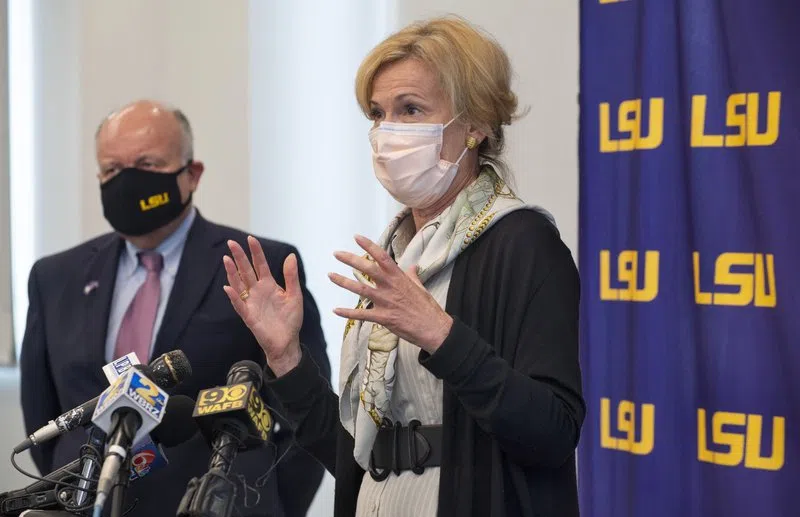BATON ROUGE, La. (AP) — The White House’s coronavirus advisers are urging Louisiana to step up its restrictions to combat the spread of COVID-19, as the number of hospitalized virus patients in the state edged higher Thursday amid a third wave of infections.
Gov. John Bel Edwards sounded the alarm about the latest spike in virus cases, saying at a grim news conference: “Make no mistake. Louisiana is in the third surge of this pandemic.”
The Democratic governor worried people will gather as usual in packed houses for the upcoming Thanksgiving holiday.
“If you’re planning on a Thanksgiving that looks like previous Thanksgivings, where you bring extended family and friends around a common dinner table, you’re making a mistake … We ought to love our loved ones enough to not want to expose them to the dangers of COVID,” Edwards said.
In its weekly report to states, the White House coronavirus task force said of Louisiana: “Current mitigation efforts are inadequate and must be increased to flatten the curve to sustain the health system for both COVID and non-COVID emergencies.”
Edwards said he doesn’t intend to return Louisiana to a stay-at-home order, but is willing to consider adding more restrictions. He and public health experts are warily watching the number of patients hospitalized with the COVID-19 disease caused by the coronavirus.
On Thursday, hospitalizations reached 929, according to the Louisiana Department of Health. While that’s well below the peak of nearly 2,000 in April, COVID-19 hospitalizations have jumped by 250 over the last week and by 43 overnight, according to the data.
Hospitals aren’t overwhelmed yet, but Edwards has cautioned the current trajectory raises that risk. Joining him at Thursday’s briefing was Dr. Christopher Thomas, who works in the COVID-19 unit of Our Lady of the Lake Regional Medical Center in Baton Rouge.
Thomas described overworked hospital staff, some who have left the profession amid the pandemic. He said Louisiana can’t request additional health care workers from other states — like it did to help hospitals in previous surges — because nearly all states are struggling with overwhelmed resources.
“We have the beds, but what we don’t have is enough nurses for all of the beds in all of the hospitals,” Thomas said.
The doctor called on people to wear face coverings and take recommended precautions.
“I wish everyone at this point would be past the idea that this is not real,” Thomas said.
At least 5,951 people in Louisiana have died of COVID-19 since March, according to the health department.
Louisiana had two prior surges of the coronavirus: the first outbreak in March and April centered in the New Orleans region, and a statewide swell in June and July. All regions of the state are seeing case spikes this month, with thousands of people testing positive over the last week.
The White House coronavirus task force report indicates the increase in Louisiana’s confirmed coronavirus infections remains lower per capita than most of the nation, but it calls for renewed measures to address “aggressive, unrelenting, expanding broad community spread.”
“Ensure masks at all times in public, increase physical distancing through significant reduction in capacity in public and private indoor spaces, and ensure every American understands the clear risks of ANY indoor interactions outside of their immediate household without masks,” the report says.
Edwards’ current Phase 3 rules allow restaurants, churches, gyms, malls, salons and most other businesses to operate at 75% capacity. Tighter limits remain on bars and sporting events. A statewide mask mandate is in place, though enforcement is spotty and many ignore the requirement.
The governor suggested if people followed his current virus rules, Louisiana’s situation would improve without the need for toughened restrictions.
The White House report warns of early signs that some hospitals are running low on masks, gowns and gloves as COVID-19 hospitalizations grow. Louisiana’s chapter of AARP also has said it continues to see shortages of personal protective equipment in the state’s nursing homes.
The state health department has reported more than 202,000 confirmed coronavirus cases since March. Nearly 186,000 people are presumed recovered, but that leaves thousands who could have active infections and be spreading the virus.
The number of people who have had COVID-19 is expected to be higher than the confirmed count because some people never have symptoms or never get tested.
The health department has reported another 9,200 probable coronavirus cases, representing cases detected through the increased use of antigen tests. Antigen tests provide quick on-site results and are less expensive to administer than the more widely used molecular tests, but the tests are deemed less accurate.









Comments